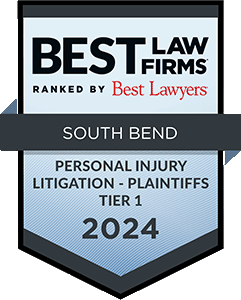 Driving when you are tired or fatigued is also known as drowsy driving and it is responsible for 100,000 traffic crashes every year, according to the National Sleep Foundation (NSF).
Driving when you are tired or fatigued is also known as drowsy driving and it is responsible for 100,000 traffic crashes every year, according to the National Sleep Foundation (NSF).
These crashes occur because fatigue causes your brain to process information more slowly, which can impair your judgment and cause an increase in risk-taking behavior. These side effects are particularly dangerous when you are behind the wheel because driving is a complex activity that involves various aspects of your brain and quick reflexes to avoid danger.
If you believe that your accident was due to a drowsy driver, contact an experienced South Bend car accident lawyer. He or she can review the details of your accident to determine if you may have a viable claim against the fatigued driver.
Who Is Most at Risk for Drowsy Driving?
Unfortunately, a wide variety of people drive when they are too tired to do so safely. However, there are certain groups who are at an increased risk for drowsy driving:
- Young Drivers – Fifty-five percent of drowsy driving accidents are caused by drivers who are younger than 25 years old, according to statistics from the NSF. Inexperience coupled with tired driving and a greater likelihood of traveling at night makes young drivers particularly vulnerable to suffering a personal injury or being killed in a drowsy driving accident.
- Shift workers and people with long hours – Night-shift workers, workers who have rotating shifts and workers who work more than 60 hours a week are six times more likely to be involved in a drowsy driving accident compared to other drivers.
- Commercial drivers – Truck drivers, long-haul drivers and other commercial drivers who drive a lot of miles and tend to drive at night are also significantly more likely to be involved in drowsy driving accidents.
- Business travelers – People traveling for work who have driven many miles or who may be jet-lagged may also be more likely to be involved in these types of accidents.
- Drivers with undiagnosed sleep disorders – Drivers may be suffering from sleep disorders like obstructive sleep apnea, insomnia or other medical conditions that cause drowsiness. They may not even be aware that they have these disorders.
- Drivers taking medications – Drivers who take certain prescription medication or over-the-counter drugs may be at an increased risk of being involved in a drowsy driving accident.
- Drivers suffering sleep loss – Drivers who are up late at night caring for a sick child, a crying baby or who are otherwise suffering a sleep debt are also at risk. Drivers who are awake for 18 consecutive hours have the same risk of a crash as a person with a blood alcohol concentration of 0.08 percent.
Danger Signs for Drowsy Drivers
Drivers who are concerned about being impacted by drowsy driving need to stay alert to potential danger signs of drowsiness. If they recognize any of the below symptoms, they should take preventive measures:
- Having trouble keeping eyes open
- Yawning frequently
- Trouble focusing or blurry vision
- Daydreaming and thoughts wandering
- Drifting from your lane
- Feelings of irritability or restlessness
- Recognizing a slower reaction time or poor judgment
- Tailgating or riding on a shoulder rumble strip
- Missing signs or exits
- Frequently blinking
- Trouble remembering the last few miles you drove
If you experience any of the symptoms above, pull off the road and take preventive measures.
How to Avoid Driving Drowsy
You can decrease the chances of being adversely affected by drowsy driving by following these tips:
- Get a good night’s sleep before long drives
- Identify places where you can stop before you embark on your trip
- Pull over for a short break if you feel tired
- Drive with a buddy on long trips so you can take turns driving; a buddy can also help recognize if you are showing signs of fatigue
- Get treatment for any diagnosed sleep conditions
- Stop every 100 miles or more frequently
- Avoid drinking alcohol, which can enhance drowsiness even in small amounts
- Avoid nighttime driving when possible
- Pull over and take a power nap if necessary
Contact an Experienced Lawyer
Drowsy driving often results in serious accidents because a driver may have fallen asleep at the wheel and may not brake at all before impact, resulting in a more dangerous accident. Despite the known dangers of drowsy driving, many people still choose to get on the roadway when they are fatigued and put others at risk.
A personal injury lawyer at Pfeifer, Morgan & Stesiak can discuss your legal options if you or a loved one was injured in a drowsy driving accident. We can discuss your case during a free consultation to determine if you can pursue compensation for the damages you sustained.
We take cases on a contingency fee basis so there is no fee unless we obtain compensation on your behalf.
Call us at (574) 444-0741 to get started today.











